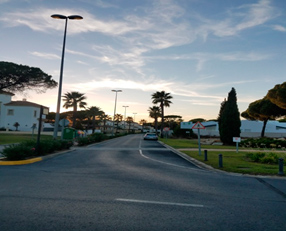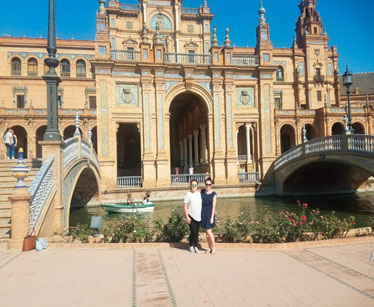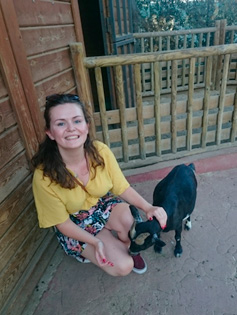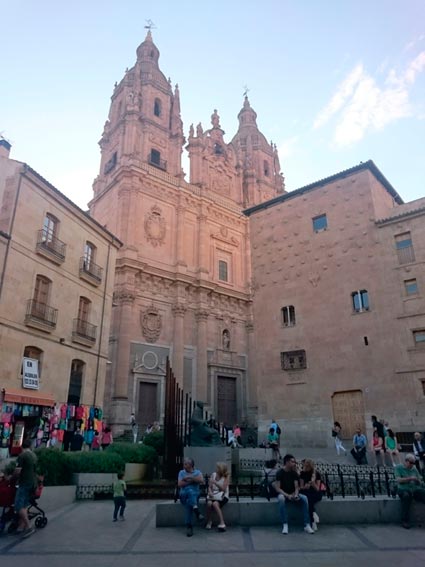Elizabeth T., who is currently a Meddeas Language Assistant, is living in a small town in Spain. She graduated with a dual degree in Spanish and Children’s Advocacy from UMASS Amherst in May 2017. Here she talks about her experience in Southern Spain and provides some advice to adapt to this rural environment.
The Experience Teaching and Living in a Small Town in Spain

I come from a coastal town in Massachusetts, and I am teaching in beautiful and sunny western Andalucía (I’ve escaped a snow-filled winter!). My school, Colegio Tierrallana, is located in a village in Spain called Aljaraque (Huelva), where I am teaching students aged six to eighteen. I am living with a host family in a spacious and filled-with-palm-trees neighborhood right next door: I walk two minutes to school every day. It’s super convenient for getting to my school every day and living with the host family has been one of the best experiences I’ve had in Spain. I’ve definitely learned lots from them and my Spanish has improved leaps and bounds because my host parents actually do not speak any English.
Living in a Spanish Village near the Capital of the Region
I’m living about a fifteen-minute walk away from the nearest bus stop needed to get to Huelva capital, the city center, and main city in the region of Huelva. Huelva itself is a small city surrounded by numerous small towns. One of the most well-known is Punta Umbria, as it is a popular destination for tourists and locals alike in the spring and summer time.

The city center of Huelva is bustling with life. It has a very large shopping center, universities, numerous restaurants and bars, shops, and quaint cafes (which are perfect for having a tea or coffee and grading papers). The center of Huelva also has a train station and a bus station with service to the surrounding towns of Huelva. Also, to further destinations such as Seville (one hour away), Portugal (one hour away), and Madrid (six hours away).
To reach the city center, it takes me a total of around twenty-five minutes walking and riding the bus. Though Huelva itself is not unlike many other Spanish cities* due to its size or the numerous things there are to do, living outside of the city center is a different experience completely. At times, it can be a bit inconvenient to have to rely on public transport when wanting to visit the city center. For example, it’s not the best when I want to have dinner with friends in Huelva.
*Only 6 cities in Spain have more than 500,000 inhabitants (Barcelona, Madrid, Valencia, Sevilla,
Zaragoza, and Málaga) and that there are 56 cities in Spain which have between 100,000
and 500,000 inhabitants. Huelva capital counts with 145,000 inhabitants.
Some Advice to Adapt to Life in a Spanish Town
After a few months living in a village in Andalucía, here is my advice when it comes to living in a small town in Spain:
1. Befriend Your Neighbors: the First Step to Immerse into the Small-Town Life in Spain
Saying hello in the mornings goes a long way. It’s a perfect way to practice your Spanish and neighbors can give you advice for enjoying the area. In my experience, everyone in my neighborhood is very friendly and willing to say hello. It can help to make you feel less lonely.

2. Go to Your Host Family for Advice
If you are living with a host family, seek advice for enjoying the area with them. Suggest a family outing or play outside with their children. They’ll be happy to fill you in and show you around.
3. Befriend the Other Teachers at Your School
Teachers at my school have been excellent resources for learning about activities to do in the area. They’re often willing to get coffee and chat after school and it has helped lots with my adjustment to life here.

4. Travel Often If You are Able
Your experience in Spain doesn’t have to be limited to the small Spanish town where you live. Try and research ways to travel on the weekends, even if it’s only a short bus ride to explore the next town over. Make it a priority to have an adventure, big or small, to look forward to every week. Last week, my adventure was exploring areas unfamiliar to me in the city center of Huelva. This week, I’m visiting Seville with a friend. It really helps to break up what can sometimes be a bit monotonous.
5. Research Things to Do in Your Spanish Village or the Next City over
I was definitely missing dance my first few months here, so I found a place that offered Salsa and Bachata classes; as well as open dancing with a DJ over the weekends. Friends of mine have signed up for yoga classes, Spanish conversation exchanges, cooking, etc. Ask around, hop on the internet, look for flyers, etc. You’re bound to find something you’ll enjoy.

6. Go to Events for Study Abroad/Erasmus Students
Going to events for international students and checking out groups for them on Facebook, Meetup.com, etc. has helped a lot. It’s a great way to make friends abroad and find activities for young people near you. There are often trips for study abroad students as well (at discounted prices). I recently went on a trip to Cadiz for Carnival and met lovely people from Armenia, Hungary, Scotland, and Mexico.
7. Find Something to be Grateful for Every Day
Whether it’s the peace and quiet, an amazing host family, long walks, or beautiful sunsets, there is always something to be grateful for. Even if it may be a little too quiet at times, the experience really is what you make of it.
I would recommend living in any city in Spain, big or small, because there is something that can be learned from all experiences. Of course, it does have the potential to be a bit inconvenient to live in a smaller neighborhood. In my experience, it’s been amazing for getting to school every day, but more difficult for exploring.
Living in a Small Town in Spain vs. City Life, by Rebecca E.
Living in the countryside versus living in the city is a long-standing debate. Hustle and bustle versus peace and quiet. Technology versus nature. Skyscrapers versus cottages.
Moving abroad gives you the chance to start afresh in a new country. Living in a small town in Spain, as in any other country, has its advantages and disadvantages. Let’s have a look at some of them.

Advantages of Living in a Spanish Village
Real Language Immersion and Possibilities to Practice Spanish
Chances are that if you move to a big city like Madrid, you’ll find that a lot of people speak English. This is because there are lots of tourists there and there is a more international environment compared to a smaller town on the outskirts. Of course, if you want to speak English all the time then that’s perfect. However, if you’d prefer to improve your Spanish and be more immersed in the culture, living in a small town in Spain could be the answer. In small towns there are fewer tourists and expats, so you’ll be able to practice your Spanish everywhere, from the local pub to the supermarket to the bus stop.
Quicker to Settle In Compared to a Massive City
If it’s your first time living in Spain, you’ll find that there are a few things you need to adapt to. For example, later meal times, greeting everyone with kisses, and expecting people to arrive late. All these things are interesting and, with time, become a normal part of everyday life. However, if you also need to try to navigate a massive city with multiple metro lines and crowded streets, it could all be a bit too much. Therefore, by living in a small town in Spain you can more quickly get to know your way around and feel more at home; even if you haven’t yet managed to master all of the cultural differences.
Cheaper Cost of Living
By living out of the city center, you’ll be able to get more for your money. Firstly, you’ll be able to save money on rent, bills, and groceries. Furthermore, since you aren’t in touristy areas, restaurants, bars, and shops won’t have inflated prices. Instead, you can enjoy the same lower price that the locals pay.
Disadvantages of Living in a Spanish Village
Fewer Facilities and Events on Weekends
Once you feel settled in and have been on placement for a few months, you may find that you’re looking for new challenges and adventures. If you live in a small town, you may find that there aren’t as many facilities or opportunities to try new things every weekend. Furthermore, festivals, concerts, and sports events are more likely to occur in the big cities than in the smaller towns. However, moving around in Spain is pretty easy and convenient.

Commuting to the City to Enjoy Nightlife or Meet with Some Friends
When there is an event on in the city or you want to meet up with some friends at a central point, you might find yourself traveling into the city center. Luckily, in Spain, public transport is quite cheap. Depending on where exactly you live and the region, it can take more or less time to travel into the city. Also, you will find that you will be limited with regard to the time you want to spend there, as the trains and buses are unlikely to run all through the night. So, if you like to enjoy nightlife or late night shopping at the weekend, living in a small town could complicate this a bit.
Less Variety to Try Something New or International Food
Although immersing yourself completely in the Spanish culture is really fun and rewarding, sometimes you might want some home comforts or even just to try something different. Unfortunately, in most villages, there isn’t a great choice of international restaurants and high street shops. Therefore, you might get a little tired of always eating the same food or shopping in the same places. Conversely, in bigger towns and cities, there is much more variety. As well as being able to try international food, for example, you’ll probably be able to visit somewhere that sells products from your home country. This can be great if you’re celebrating one of your own national holidays or if you feel a bit homesick.
So, whether or not to live in a small town in Spain is a difficult decision as there are arguments on both sides. Overall, wherever you decide to live in Spain has the potential to become your second home and win a place in your heart. That’s because the Spanish people are welcoming and warm and the Spanish culture is rich and enchanting.
Please let us know if you have any tips for making this big decision by commenting below!










6 Responses
It’s way too easy to just hang out with English speakers living in the city
Makes me a bit envious. I live in Barcelona and wouldn’t change it for the world, but I could only imagine first moving to Spain and being placed in a small village. It would certainly push you further out of your comfort zone (for the best), encourage you to try new things and, of course, it would help immensely with Spanish as there are less English speakers around to help you out. In all, a great read! 🙂
I also lived in a small town my first year! I definitely think it made me love Spain more and helps you to get out of your comfort zone because you want have any comforts from home and there won’t be as many English speakers! I definitely agree with you: your coworkers are your best way make connections and do things outside of school, learn the Spanish culture, and make new friends! I even think living in a small town will help improve your Spanish tremendously as you are almost forced to speak it all the time because nobody speaks English! Thanks for your article!
Great article and tips, I agree with everything. I live in a medium sized city here in Spain but can relate as I lived in a super small town in Korea that consisted of a small group of foreigners and mainly a lot of older people. I made good friends with people in nearby towns and we would all meet up during the weekdays for dinner in one of the bigger towns closest to us and we always travelled somewhere (to bigger cities, to festivals) at the weekends. I took a language class and went to an exchange in a city 1.5 hours away. But living in such a small town allowed me to get to know the locals and practice my language skills. I did a taekwondo class in my town and also met with other teachers there for coffee etc. Small towns don’t have to be boring, enjoy it and also break away from the routine from time to time. Having visitors over also gives you a chance to show them your town and even you can learn more about it!
Thanks for sharing my experiences! It’s interesting to see how similar they are to Rebecca’s. Regardless, this experience is what you make of it and I’m so lucky to have learned so much the past six months.
Hi! Loved this post and can strongly related to everything in it! Although I’m living in Madrid now, I was an assistant in a small town in Castilla la Mancha 2013-2014 and reading your tips really brought back those memories! I especially liked no.7 about finding something to be grateful for every day – what a great tip. It’s so simple, but so effective for making your experience the absolute best it can be. You look like you’ve knocked it off being in Andalucía, which is such a beautiful region and really rich in history and traditions.
One more tip I might add for settling in in a small town is be as open as you can to making Spanish friends. I was very nervous about never actually making friends who were from the town and always getting together with other assistants, but when I changed my mentality and just forgot myself a bit, I ended up making some of the best friends I’ve ever had in my life!